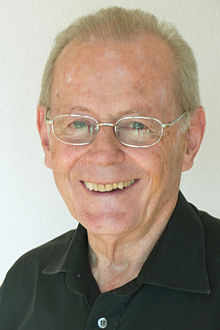- Niklaus Brantschen
-
Niklaus Brantschen (born 25 October 1937 in Randa, Valais) is a Swiss Jesuit, Zen master of the White Plum Sangha line and founder of the Lassalle-Institute within the Lassalle-House in Bad Schönbrunn/Zug, Canton of Zug. He is co-initiator of the Jerusalem-Project.
Contents
Early life
Niklaus Brantschen grew up with six brothers and sisters in a traditionally Catholic family; he is a skilled mountaineer.[1]
22-year-old he joined the Society of Jesus. After the novitiate in Villars-sur-Glâne he received the licentiate of the Munich University of Philosophy in 1964. As practical studies he worked in 1964-67 as an educator at the Stella Matutina (Jesuit school) in Feldkirch/Austria followed by three years of theology studies at the university of Fourvière/Lyons (France) and a fourth year at the University of Tübingen, among others from the professors Eberhard Jüngel, Jürgen Moltmann, Walter Kasper, Hans Küng; Licentiate work about Dietrich Bonhoeffer. In 1970 he celebrated his first Mass (liturgy) in Randa. From 1973 he made a certificate study in adult's education in Munich as assistant of meditation teacher Klemens Tilmann, followed by meditation courses with Karlfried Graf Dürckheim.
Zen education
From 1976 he made regular education stays for Zen studies in Kamakura, Kanagawa/Japan with Hugo Makibi Enomiya-Lassalle and Yamada Kôun Roshi. There, meetings with Heinrich Dumoulin, Jerry Brown, Willigis Jäger, Johannes Kopp. In 1988 he was given the teaching competence for Zen by Yamada Roshi, in 1999 he received the confirmation of a Zen master ("inka shōmei") from Tetsugen Bernard Glassman.
1986 Brantschen met Jerry Brown in Japan and held inspiring conversations, 1987 he practised Zen together also with him.[1]
Other activities
Between 1973 and 1977, Brantschen was assistant manager of the educational institution Bad Schönbrunn near Menzingen, until 1987 he was its manager. For the next five years he worked as a student minister at different colleges in Zürich. In 1993 he positioned the educational institution Bad Schönbrunn new as a centre for spirituality and social consciousness and renamed it Lassalle-Haus. In 1995, together with Pia Gyger, he founded the Lassalle-Institut, an institution in the fields of Zen, ethics and leadership, which they both led until 2002.[2] Within the institute both are involved especially in the project Jerusalem – Open town for learning of the peace in the world which leads them regularly to Jerusalem and to the UN in New York.
Interfaith dialogue
According to Brantschen there is no alternative to the interfaith dialogue. This concept denotes not only conversation, but also the positive, constructive relations between persons and communities of other religions for the mutual enrichment.[1] „To be religious today calls to be interreligious, not only bilaterally but multilaterally.“[1]
Position to the Buddhism
Brantschen considers the dialog with Buddhism as an enriching, but not straight or concluded way between the East and West, which springs up in the suspense between real Zen-experience and imitation of Christ. He sees strong parallels between Christian spiritual exercises and Zen-practice, which for him have formed a synthesis during the years.[1]
The practice of Zen is a way to remove the barriers between religions, nations and races – to create a united humanity.[1]
Partnership of man and woman
For Brantschen collaboration in partnership is an important contribution for a necessary global change of consciousness. Something truly new originates only if man and woman live a culture of partnership with equal rights.[1] For him „humanity is like a bird with both wings like man and woman. If a wing is not equally developed, we do have a banking bird which cannot make his way.“[1]
Judgments
In his characteristic style Brantschen summarizes his judgments in concise sentences:[1]
- Only who is unselfish, is really happy.[1]
- Who hangs on his spiritual experiences and wants to preserve them, destroys them and obstructs his way to the new.[1]
- A man is not what he „does“; he is not what he „has“; he is not what he „is“; he is what he loves.[1]
- Ethics, which we mean, founds in the careful percipience of life in all of his forms, in clever judgment and in suitable lasting action for the well-being of all. This is not possible without comprehensive self- and world-experience, without a more profound view of the reality.[1]
Published works
Brantschen has written 14 books, most in German, some edited in Italian or Spanish.[3]
References
- ^ a b c d e f g h i j k l m Autobiography in German of Niklaus Brantschen: Auf dem Weg des Zen: Als Christ Buddhist (On the way of Zen: As a Christian Buddhist), Kösel 2002, ISBN 3-466-36599-6, p. 29-30, 126-129, 14, 174, 55, 205, 206, 195, 88, 89, 205
- ^ Biography on website of Lassalle-Institute
- ^ Entries of books of Niklaus Brantschen in Catologue of German National Library
External links
Categories:- 1937 births
- Living people
- People from Visp District
- Swiss Jesuits
- Ignatian spirituality
- Swiss Roman Catholic priests
- 20th-century Roman Catholic priests
- Zen Buddhist teachers
- Catholic ecumenical and interfaith relations
- Swiss writers in German
- Roman Catholic writers
- Religious writers
Wikimedia Foundation. 2010.

